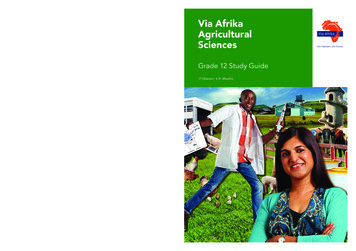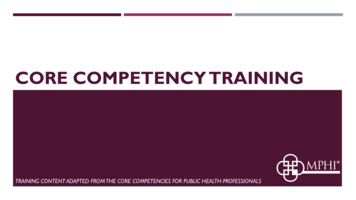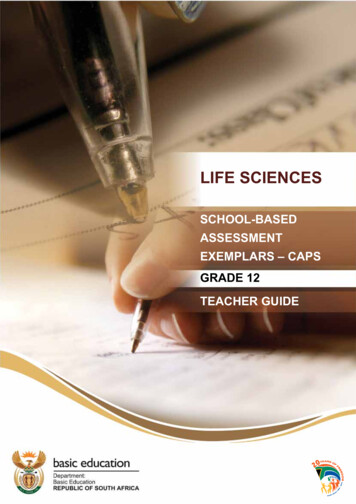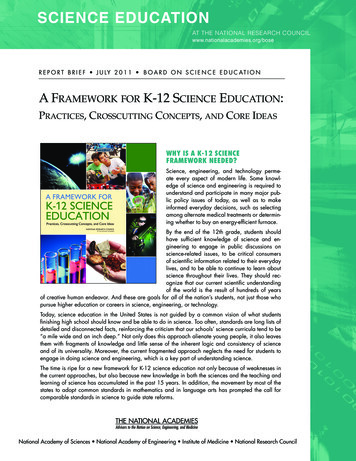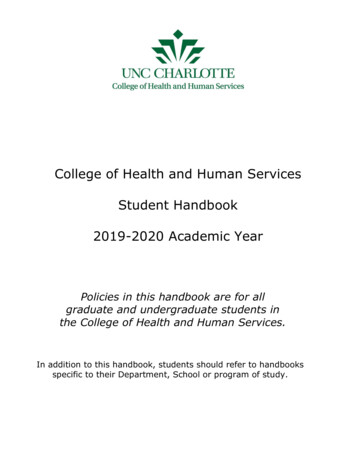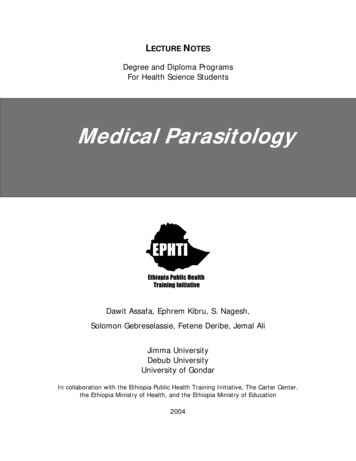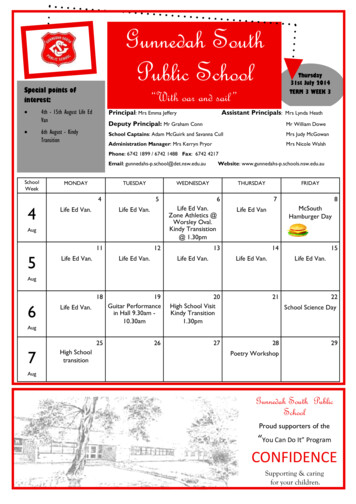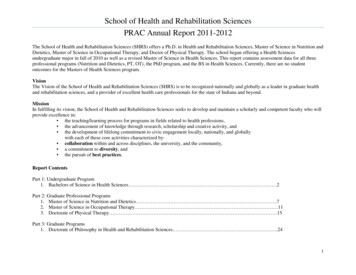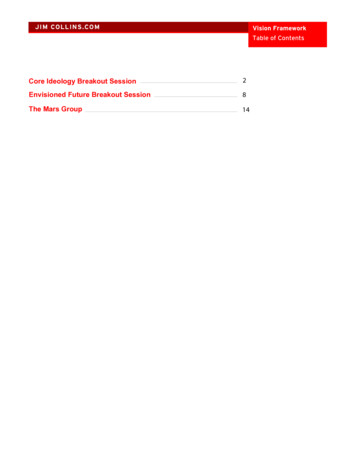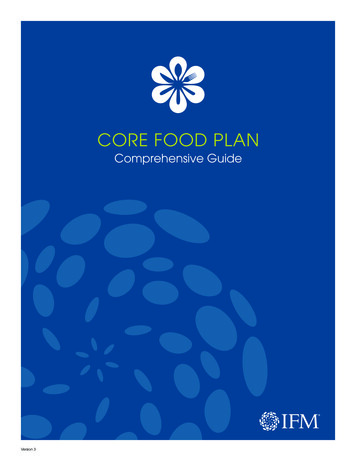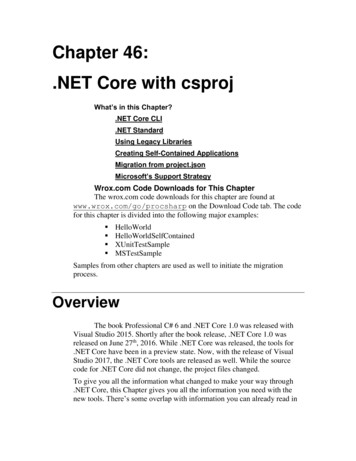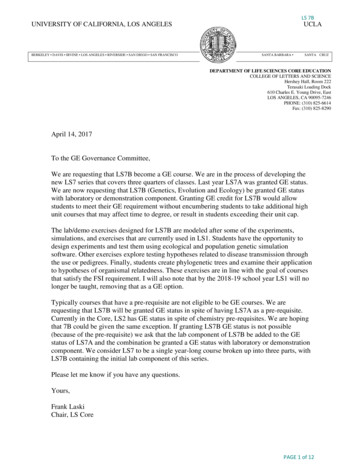
Transcription
LS 7BUNIVERSITY OF CALIFORNIA, LOS ANGELESBERKELEY DAVIS IRVINE LOS ANGELES RIVERSIDE SAN DIEGO SAN FRANCISCOUCLASANTA BARBARA SANTA CRUZDEPARTMENT OF LIFE SCIENCES CORE EDUCATIONCOLLEGE OF LETTERS AND SCIENCEHershey Hall, Room 222Terasaki Loading Dock610 Charles E. Young Drive, EastLOS ANGELES, CA 90095-7246PHONE: (310) 825-6614Fax: (310) 825-8290April 14, 2017To the GE Governance Committee,We are requesting that LS7B become a GE course. We are in the process of developing thenew LS7 series that covers three quarters of classes. Last year LS7A was granted GE status.We are now requesting that LS7B (Genetics, Evolution and Ecology) be granted GE statuswith laboratory or demonstration component. Granting GE credit for LS7B would allowstudents to meet their GE requirement without encumbering students to take additional highunit courses that may affect time to degree, or result in students exceeding their unit cap.The lab/demo exercises designed for LS7B are modeled after some of the experiments,simulations, and exercises that are currently used in LS1. Students have the opportunity todesign experiments and test them using ecological and population genetic simulationsoftware. Other exercises explore testing hypotheses related to disease transmission throughthe use or pedigrees. Finally, students create phylogenetic trees and examine their applicationto hypotheses of organismal relatedness. These exercises are in line with the goal of coursesthat satisfy the FSI requirement. I will also note that by the 2018-19 school year LS1 will nolonger be taught, removing that as a GE option.Typically courses that have a pre-requisite are not eligible to be GE courses. We arerequesting that LS7B will be granted GE status in spite of having LS7A as a pre-requisite.Currently in the Core, LS2 has GE status in spite of chemistry pre-requisites. We are hopingthat 7B could be given the same exception. If granting LS7B GE status is not possible(because of the pre-requisite) we ask that the lab component of LS7B be added to the GEstatus of LS7A and the combination be granted a GE status with laboratory or demonstrationcomponent. We consider LS7 to be a single year-long course broken up into three parts, withLS7B containing the initial lab component of this series.Please let me know if you have any questions.Yours,Frank LaskiChair, LS CorePAGE 1 of 12
LS 7BGeneral Education Course Information SheetPlease submit this sheet for each proposed courseDepartment & Course NumberCourse TitleIndicate if Seminar and/or Writing II courseLife Science 7BGenetics, Evolution, and Ecology1 Check the recommended GE foundation area(s) and subgroups(s) for this courseFoundations of the Arts and Humanities Literary and Cultural Analysis Philosophic and Linguistic Analysis Visual and Performance Arts Analysis and PracticeFoundations of Society and Culture Historical Analysis Social AnalysisFoundations of Scientific Inquiry Physical ScienceWith Laboratory or Demonstration Component must be 5 units (or more) Life ScienceWith Laboratory or Demonstration Component must be 5 units (or more)X2. Briefly describe the rationale for assignment to foundation area(s) and subgroup(s) chosen.Students examine the processes research scientists use to answer questions related to the evolutionof life on Earth, inheritance of various characteristics, and the importance of species interactions andhow it relates to ecosystem function. Students also have the opportunity to make observations of thenatural world, formulate testable hypotheses, and evaluate their hypotheses with simple statisticalmethods.3. "List faculty member(s) who will serve as instructor (give academic rank):Frank Laski Professor; Debra Pires Academic Administrator; additional ladder facultyDo you intend to use graduate student instructors (TAs) in this course?YesXNoIf yes, please indicate the number of TAs 1 TA/72 students4. Indicate when do you anticipate teaching this course over the next three ingEnrollmentSpringEnrollmentX720X720Page 1 of 3X1000X1000PAGE 2 of 12
LS 7B5. GE Course UnitsIs this an existing course that has been modified for inclusion in the new GE?If yes, provide a brief explanation of what has changed.YesNoXPresent Number of Units:Proposed Number of Units:6. Please present concise arguments for the GE principles applicable to this course. General KnowledgeThe course provides background on the history of life, and principles applicableto the maintenance and generation of biodiversity. Basic principles of geneticsand heritability emphasize the evolution of life and how adaptations in organismsare relevant to all levels of ecology and species’ interactions. Integrative LearningThe course bridges topics in genetics, cellular biology, evolution, and ecology. Ethical Implications Cultural Diversity Critical Thinking Rhetorical Effectiveness Problem-solving Library & InformationLiteracyThe course emphasizes the primary literature and evaluation of data from historicand current examples of genetics, evolution, and ecology.Students evaluate data from multiple sources to examine questions relevant tounanswered questions about species relatedness, disease inheritance, andecological questions related to conservation biology. There is also extensiveproblem solving involved in learning the basic concepts of Mendelian genetics.Page 2 of 3PAGE 3 of 12
LS 7B(A) STUDENT CONTACT PER WEEK (if not applicable write N/A)1.2.3.4.5.Lecture:Discussion Section:Labs:Experiential (service learning, internships, other):Field Trips:(A) TOTAL Student Contact Per 2.5(B) OUT-OF-CLASS HOURS PER WEEK (if not applicable write N/A)1.2.3.4.5.6.7.General Review & Preparation:ReadingGroup Projects:Preparation for Quizzes & Exams:Information Literacy Exercises:Written Assignments:Research (hours)(hours)(B) TOTAL Out-of-class time per week10.5(HOURS)GRAND TOTAL (A) (B) must equal at least 15 hours/week15(HOURS)COMMENTThe LS7 course covers three quarters. Last year LS7A was granted GE status. We are nowrequesting that LS7B be granted GE status with laboratory or demonstration component.Granting GE credit for LS7B would allow students to meet their GE requirement withoutencumbering students to take additional high unit courses that may affect time to degree, orresult in students exceeding their unit cap.The lab/demo exercises designed for LS7B are modeled after some of the experiments,simulations, and exercises that are currently used in LS1. Students have the opportunity todesign experiments and test them using ecological and population genetic simulation software.Other exercises explore testing hypotheses related to disease transmission through the use orpedigrees. Finally, students create phylogenetic trees and examine their application tohypotheses of organismal relatedness. These exercises are in line with the goal of coursesthat satisfy the FSI requirementTypically courses that have a pre-requisite are not eligible to be GE courses. We arerequesting that LS7B will be granted GE status in spite of having LS7A as a pre-requisite.Currently in the Core, LS2 has GE status in spite of chemistry pre-requisites. We are hopingthat 7B could be given the same exception. If granting LS7B GE status is not possible(because of the pre-requisite) we ask that the lab component of LS7B be added to the GEstatus of LS7A and the combination be granted a GE status with laboratory or demonstrationcomponent. We consider LS7 to be a single year-long course broken up into three parts, withLS7B containing the initial lab component of this series.Page 3 of 3PAGE 4 of 12
LS 7BCourse InformationLS7B Evolution, Ecology, and BiodiversityInstructor:Debra PiresOffice Hours: Monday 11AM-1PM; Tuesday 8AM – 9:30AMHershey Hall 227debpires@ucla.eduFrank LaskiOffice Hours: TBATSLB 5018Laski ls4@lifesci.ucla.eduText: How Life Works by Morris, J et al. 2e, with LaunchPadLaunchPad Website: e/4906335Course TAs: Below you will find the information for the TAs if you have questionsrelated to the discussion sections please ask the appropriate TA.Tina MarcroftAudra A. tures: TR 11:00AM– 12:15PM, Kinsey Pavilion 1220B, lectures are podcasted.During lecture, the clicker questions and activities will be based on the reading listed inthis syllabus, recorded lecture videos (these are posted on CCLE), and any additionalhandouts, readings, or animations posted on the LaunchPad website or handed out inclass. There will be additional examples given in the class that may not be from the text,but are chosen to help in understanding different concepts in the course. Lecture slideswill be posted on the course website the night before (by 10PM) so that you can printthem out and bring them to class if you choose. At the end of each week the clickerquestions andLab: You will attend lab every week. Attending lab is not optional, but mandatory andthere are 20 points designated for each week’s lab section. These lab sections aredesigned to: 1. Help reinforce many of the concepts you learn in class, 2. Give you theopportunity to get practice with exercises and problem sets related to lecture topics, 3.Give you the opportunity to ask questions and think about topics in small groups. Youmust attend the section in which you are enrolled. If there is an extenuatingcircumstance and you must attend another section once, then you must discuss this withyour TA and the TA of the section you would like to attend. There are no make-upsections. The activities, assignments, exercises, and quizzes you will do in each labsection will vary by week (i.e. there may not be a quiz each week for lab section). Anannouncement will be made in class each week about what to expect in that week’s labsection. At the end of the quarter to lowest lab score will be dropped.Reading Quizzes: There will be a quiz administered through the course website onLaunchPad (see link above) beginning Week 1 and ending Week 10, some weeks willhave two reading quizzes and other weeks will have only one. You need to consult theLaunchPad website for due dates for each quiz. These quizzes are based on the currentPAGE 5 of 12
LS 7Bweek’s reading. For example, in order to prepare for the Week 2 reading quiz, read theassigned material in the syllabus for Week 2. The reading quiz is available Saturday at 8AM until Tuesday at 9 AM. You will be given 20 minutes for the quiz, you must login withat least that much time remaining for the quiz (i.e. logging in at 7:50AM on Tuesdays willonly give you 10 minutes to complete the quiz). The best way to avoid any timingproblems with the quiz is to take it early and not wait for the last minute. The quizzes areopen book, but not meant to be done collaboratively with other students in the course.You are expected to work alone while completing the quiz.LaunchPad: In addition to the reading quizzes, you will have additional assignmentsthat will be given through the LaunchPad website. These include reading assignments,animations, and simulations. For some assignments, you will receive points forcompletion and for others points will be awarded based on how well you complete theassignment. No late work will be allowed for the LaunchPad assignments, they must becompleted on time in order to receive points. The total number of points from LaunchPadwill be scaled to your percentage out of 80. Here is a general breakdown of what toexpect on LaunchPad: Weekly units will become available Thursday evening of the previous week. Forexample, Week 2 material will become available the Thursday of Week 1.Reading quizzes will appear Saturday at 8am and close Tuesdays at 11am.These are designed to help you prepare for class, so the Week 2 reading quizwill be due the Tuesday morning of Week 2 before we meet for class. If there aretwo reading quizzes in one week the reading quiz for Thursday’s class meetingwill be available from Tuesday at 12:30PM until Thursday at 11AM.Reading assignments for each week will be due Mondays at 11:59pm. Becauseeach chapter section is its own reading assignment, it will look like you have a lotof assignments due on LaunchPad each week – but don’t worry! It’s really not asbad as it looks.Additional activities may be assigned to help you prepare for class. These will bedue by 11am the morning of the relevant class day.Additional activities and animations will be assigned to help you review andsynthesize material after class. The due date of these activities will vary.Exams and Review Sessions: We will have a review session before the midterm andthe final. Room reservations and review times are still pending and you will be notified inclass and via e-mail of the room and time for each review. You have one midterm for thecourse. The midterm will be 6:00-7:50PM Thursday, February 16. The final exam will be11:30AM-2:30PM Tuesday, March 21. You must take the exams at the scheduled timeand date as there are no make-up exams. Fail to appear, hand in, or take an exam willresult in a zero for that exam. There are no exceptions to this policy.Exams and Grading: Material for the exams will be taken from lectures, the text,additional posted readings, problems that have been posted on the course website,material from discussions, and problems done in lecture. There will be a mix of multiplechoice and true/false questions on the exam. The exam will cover all material up until theThursday before the exam. All exam grades will be posted to MyUCLA. You will be ableto review your midterms during TA office hours up until Friday of Week 9. You will not beable to keep your midterm or final exam test booklets.PAGE 6 of 12
LS 7BClickers: Students are required to bring their clickers the first day of class in Week 1.You can use the iClicker or iClicker2 for participation. The web-based app (REEFPolling by i clicker) can also be used if you have a compatible device and a sufficientWIFI connection. For iPhone and iPad users, search for REEF Polling in the Apple appstore. For Android and laptop users, go to reef-education.com on your web browser andsign in. After you purchase a clicker you need to register your iClicker ID on the CCLEcourse website before the start of class. There is a link on the right panel of the coursewebpage for iClicker registration. We will show you where to register on the first day ofclass if you cannot find it on your own, or aren’t clear what you need to do.Each day is worth 4 points (all or nothing) towards your participation score. You will needto answer 75% of the questions on each day in order to receive credit. You are notawarded points based on correct/incorrect answers. You will be given two “free” days ofparticipation points. This should account for any technical difficulties, absences, orforgetting your clicker. You cannot receive more than the 80 points awarded forparticipation i.e. if you have perfect attendance the points for the “free days” will not beadded to your final score.You must check your clicker participation scores at the end of Week 2 to make sure yourparticipation credit is being scored. Any discrepancies must be dealt with by the end ofWeek 3. After that, no further edits to clicker registrations will be made. Failure to informme of any issues by Friday of Week 3 will result in loss of participation points at the endof the quarter.For any administrative issues please visit: Life Sciences Core Education OfficeHershey Hall, Room 222 (310) 825-6614For enrollment questions, you may contact this office listed above by email(lscore@lifesci.ucla.edu). If you miss class and have documentation for your absence,you may contact Michelle Veintimilla (mveintimilla@lifesci.ucla.edu) in the Life SciencesCore Education Office. Documentation must be submitted within 7 days of the absence.Course Grading: If the class mean is 75% or higher, letter grades will be based on astraight percentage of the total points for the course. Within each letter grade, a minuswill be assigned to the bottom three percentage points and a plus will be assigned to thetop three percentage points (i.e. 80-82.9% is a B-, 87-89.9% is a B ). If the class meanis lower than 75% the scale will be adjusted to compensate (e.g. 89% may become anA-). Under no circumstances will grades be curved down. You can use the straightgrading scale as an indicator of your minimum grade in the course, you should keeptrack of your own points so that at any time during the quarter you know your minimumstanding in the class. If and when, for any reason, you have concerns about your gradeor performance in the course, then that is a great time to meet with us so we can discussstudy techniques or alternative strategies to help you along in the course.Regrading policy: Any request for a regrade must be made within one week of theassignment being returned to you. If you think there has been a simple addition error onyour assignment then write a note explaining the error, attach this to the front of theassignment and turn it into the LS Core office. If the error is confirmed, then the pointswill be added to your score before the end of the quarter. If you think there was an errorin grading that is not an addition error, write a brief note explaining why you think morePAGE 7 of 12
LS 7Bpoints should be awarded, attach this to the front of the assignment and turn it into theLS Core office. In the event that you do turn in a regrade, you should make a photocopyfor your own records. All regrades (except addition errors) will be done at the end of thequarter after we have calculated final grades. If the points you request will affect yourfinal grade then we will reevaluate the assignment for the contested points.Point Breakdown:MidtermFinal ExamLabParticipationLaunchPadReading QuizzesVideo Quizzes12022018080505050Total Points750Academic Dishonesty: Our best advice to you is just don’t do it!!! If you are caughtcheating (e.g. giving answers to someone else, receiving answers from someone else,turning in any written work that is not your own for points in the course, copyingpassages from websites, copying passages from your or any other textbook, you shouldbe getting the idea by now ) on any graded material in the course you will receive azero as your score for that assignment. If you are caught cheating on an exam (usingnotes; cell phones to send, receive, or research an answer; looking on someone else’sexam or allowing someone else to look at your exam for answers) you will receive ascore of zero for the entire exam. Any violation of academic dishonesty will result withbeing referred immediately to the Dean of Students – NO EXCEPTIONS – for furtheraction.PAGE 8 of 12
LS 7BWeek123Case study incancerMendelianGeneticsInheritance4Evolution vianatural rsity, andMacroevolutionTree of Life andPatterns ofBiodiversityEcology78910Speciesinteractions andCommunitiesBiodiversity,Global Ecology,and ConservationTopicIntro to course and cancerMendel’s lawsPedigreesMeiosisGenetic linkageGenotype and disease riskModes of SelectionHardy-Weinberg Law,Mechanisms of EvolutionApplications of HardyWeinbergSpeciationBiodiversity throughPhylogeniesPhylogenetic TreesBiodiversity through timeHow do radiation andextinction shape biodiversity?Applications of EcologyDemography and PopulationEcologySpecies InteractionsCommunity EcologyReading*13.1 and 2, case 316.1-416.511.1-3, 17.1,2,4, and 5, 15.417.3, 18.1 and 3, 19.1TBD21.4, 45.621.1-3, 5 and 6Global EcologySpecial Topics48.1-349.1-622.1-423.1-4, Case 848.4, Figure 44.42(review 22.3)25.1 and 246.1-425.347.1-5Weekly Labs:Week 1: DNA mutations, repair, and BRCA 1Week 2: Meiosis overview and patterns of inheritanceWeek 3: Meiosis, linkage, and chromosomal rearrangementsWeek 4: Population GeneticsWeek 5: SpeciationWeek 6: Biodiversity IWeek 7: Biodiversity IIWeek 8: EcologyWeek 9: Species InteractionsWeek 10: Conservation Biology*Additional reading handouts for labs or lectures may be posted to CCLE and/orLaunchpad.N.B. This syllabus represents the content of the course at the time of its printing.Modification may be made if deemed necessary. All students will be notified via anannouncement in lecture, and a posting on the course website of any changes to thesyllabus should they occur.PAGE 9 of 12
LS 7BNew Course ProposalLife Sciences 7BGenetics, Evolution, and EcologyCourse Number Life Sciences 7BTitle Genetics, Evolution, and EcologyShort Title GENETICS&EVOL&ECOLUnits Fixed: 5Grading Basis Letter grade onlyInstructional Format Lecture 3 hours per weekDiscussion 110 hours per weekTIE Code LECS Lecture (Plus Supplementary Activity) [T]GE Requirement NoRequisites Enforced requisite: LS7ACourse Description Lecture, three hours; discussion, 110 minutes. Enforced requisite: course7A. Principles of Mendelian inheritance and population genetics.Introduction to principles and mechanisms of evolution by natural selection,population, behavioral, and community ecology, and biodiversity, includingmajor taxa and their evolutionary, ecological, and physiologicalrelationships. Letter grading.Justification The primary reasons for revising the LS Core Curriculum is to decrease thetime to degree for Life Science majors and increase retention rates in STEMmajors. Out of all of the aspiring LS majors entering UCLA from 2005 to2008, nearly one third (31%) switched into Humanities, Arts, and SocialSciences (HASS) before completing their degrees within a 6 year period(UCLA Office of Analysis and Information Management). This LS attritionrate was disproportionately high for under represented minority (URM)students, only 37% of which completed their intended LS degree.SyllabusFile LS7B Syllabus.docx was previously uploaded. You may view the file by clicking on the file name.Supplemental Information We propose that a revised introductory LS series will help address theretention and time to degree problems currently experienced among LSmajors. Specifically, the proposed curriculum will:1. Make introductory LS courses more accessible so that LS majors can takemore LS courses in their first year at UCLA.2. Facilitate entry into upper division major courses by the start of students'third year.3. Reduce time to degree for freshman admit students and facilitate entryinto major courses earlier in their academic careers.4. Promote success of transfer students by reducing the number of lower division courses that must be taken at UCLA before advancing to majorcourses.Grading Structure Letter grade only. In class quizzes and reports expected. One or twomidterm exams will be administered along with a final exam.Effective Date Fall 2016InstructorQuarters TaughtNameTitleFrank LaskiProfessorFallWinterSpringSummerDepartment Life SciencesContactNameE mailPAGE 10 of 12
Routing HelpTRACY KNOXtracyn@lifesci.ucla.eduLS 7BROUTING STATUSRole: Registrar's OfficeStatus: Processing CompletedRole: Registrar's Publications OfficeStatus: Hennig, Leann Jean (LHENNIG@REGISTRAR.UCLA.EDU) 56704Added to SRS on 5/14/2016 9:33:36 PMChanges: DescriptionComments: Edited coursedescription into official version.Role: Registrar's Scheduling OfficeStatus: Added toChanges: Thomson, Douglas N (DTHOMSON@REGISTRAR.UCLA.EDU) 51441SRS on 5/6/2016 12:35:38 PMTitle, Short TitleComments: NoCommentsRole: FECSchool Coordinator Kikuchi, Myrna Dee Castillo (MKIKUCHI@COLLEGE.UCLA.EDU) 45040Status: Approved on 5/6/2016 11:35:37 AMChanges: NoComments:Changes MadeApproved by College FEC Chair, Joe Bristow. Routing to Doug Thomson in the Registrar's Office.Role: Dean College/SchoolStatus:or Designee Webster, Kimberly Ann (KAWEBSTER@COLLEGE.UCLA.EDU) 3108254673Approved on 5/3/2016 4:07:13 PMChanges: NoChanges MadeComments: Approved byRole: L&SDean Victoria Sork on 5/3/2016. Approved in CIMS by Kimberly Webster on behalf of Dean Sork.FEC Coordinator Kikuchi, Myrna Dee Castillo (MKIKUCHI@COLLEGE.UCLA.EDU) 45040Status: Returned for AdditionalChanges:Info on 5/2/2016 1:24:15 PMEffective Date, Quarters TaughtComments: Routing toKimberly Webster for Dean Sork's approval.Role: Department/SchoolCoordinator Knox, Tracy L (TRACYN@LIFESCI.UCLA.EDU) 58445Status: Approved on 5/2/2016 1:02:51 PMChanges: NoComments:Changes MadeTracy Knox, MSO, on behalf of Frank Laski, Chair, LS CoreRole: L&SStatus:FEC Coordinator Kikuchi, Myrna Dee Castillo (MKIKUCHI@COLLEGE.UCLA.EDU) 45040Returned for Additional Info on 5/2/2016 12:15:38 PMChanges: NoChanges MadeComments: Routing toTracy for dept chair approval. Also, change "Effective Date" to a future term.Role: Initiator/Submitter Knox, Tracy L (TRACYN@LIFESCI.UCLA.EDU) 58445Status: Submitted on 5/2/2016 11:56:34 AMComments: Initiated aNew Course ProposalMain Menu InventoryRegistrar's OfficeReportsMyUCLAHelp ExitSRWebPAGE 11 of 12
Comments or questions? Contact the Registrar's Office atcims@registrar.ucla.edu or (310) 825 6704LS 7BPAGE 12 of 12
Page 1 of 3 General Education Course Information Sheet Please submit this sheet for each proposed course Department & Course Number Life Science 7B Course Title Genetics, Evolution, and Ecology Indicate if Seminar and/or Writing II course
